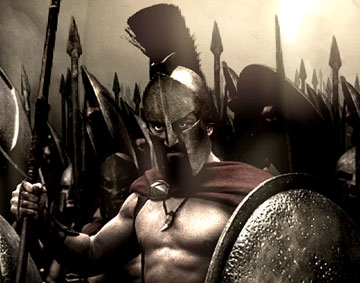300: Greek Moussaka Recipe 🥁🥁🥁1/2
/Year Released: 2007
Directed by: Zack Snyder
Starring: Gerard Butler, Lena Headey, Rodrigo Santoro, Dominic West
(R, 116 min.

"When you go home/ Tell them of us and say/ For their tomorrow/ We gave our today." Spartan Epitaph
This definitely is not a chick flick. It is a testosterone charged comic book romp through one of the most celebrated battles in history, when 300 Spartans stood against a vast sea of the advancing Persian army at the famed Battle of Thermopylae in 480 B.C.
Its 70 million dollar opening has not only impressed Hollywood moguls, but it has managed to ignite a war of words among such disparate groups as academics, Iranian propagandists, and movie critics while simultaneously overflowing theaters with paled faced video-geeks who have finally found a reason to abandon their game screens for the cinema.
It is certainly every history teacher’s dream that a battle so distant and far away should capture such rapt attention. For instance, Ephraim Lytle, hard core Hellenistic historian, refuses to quibble over the Spartan’s Chippendale battle garb, but seems definitely put off by what he considers a whitewashing of this brutal people. He is particularly displeased that the five-member council of Ephors, Sparta’s elected highest officials, are portrayed as “lecherous and corrupt geriatric lepers.”
Classical scholar Victor Davis Hanson allows for some stylized comic book camp, and protests that the 300 accurately recalls scenes of battle right from Herodotus’s account. Any chauvinistic patriotism comes directly from a line of Greek historians and poets who “long ago boasted that Greek freedom was on trial against Persian autocracy, free men in superior fashion dying for their liberty, their enslaved enemies being whipped to enslave others.”
But it is the over the top Persian King Xerxes (Rodrigo Santoro) who gets the most attention. With shaven head, penciled eyebrows, his eight-foot frame bedecked in golden body piercings, this sexually ambiguous god-king appears atop a “traveling throne that resembles a particularly louche Brazilian gay-pride carnival float” (Critic David Kahane). His vast army is made up of freaks, strange beasts, and slaves their king would gladly sacrifice for his empire when he can’t annex neighboring states through simple bribery or corruption. No wonder Iranians around the world are so offended by this portrait of their Persian predecessors, proclaiming on some blog sites, their slightly altered oldie: “Death to the owners of Hollywood.”
Quibbles aside, I must admit I enjoyed the spectacle ever so much more than Sin City, another film adaptation of Frank Miller’s comic book graphics, the only film ever receiving a one drum rating on this site. Perhaps the ever-present gore doesn't appall as much in the context of brave men fighting voluntarily for home and country, where courage, honor and duty trump everything else. And while certain details are altered to make the Spartans more heroic, the film makers do not spare the death by exposure meted out to infirm babies, or the cruel admonition of mothers to their sons: “Come back with your shield or on it.” [In this case, the Spartan farewell is exchanged between King Leonidas (Gerard Butler) and his queen (Lena Headey)].
In this day and age of fruitless negotiations endlessly proffered by dubious diplomats, it is shockingly refreshing to see Leonidas’s reaction to the threatening ultimatum brought by Xerxes’s messenger. He and his whole unctuous contingency are unceremoniously thrown down a huge well, a tactic later doled out to hordes of Persian beasts and men at the cliffs of Thermopylae.
These battle techniques and tactics are fascinating, recalling Leonidas’s wisdom that brain not brawn is a soldier’s greatest ally. The choice of Thermopylae’s narrow pass to make their stand gives the Spartan’s phalanx of fighters some chance of holding off the Persian offensive. Their thick rounded shields, wherein the army becomes one under a protective panoply, even resists the onslaught of Persian arrows that so darken the sky, allowing the Spartans a short victory as they “fight in the shade.”
It is that spirit of righteous defiance, that impassioned love for freedom that will live on long after the outnumbered Spartans who sacrificed their all. May it long live in our hearts as well.
— Kathy Borich

Film-Loving Foodie
If I really wanted to be authentic, I could post a recipe for the thin black gruel that young Spartan would be warriors sustained themselves on during their agoge or martial training. Well, maybe sustained is not the right word, since, by design this unappealing porridge was not really meant to nourish them, thus encouraging the boys to raid local farms for a more fulfilling diet.
Their successful thievery was never punished, only their lack of finesse if they were ever caught. Thus, hungry warriors would learn at an early age how to fend for themselves when the rations ran out.
But if Director Zack Snyder can get away with clothing his 300 in leather speedos, then I feel completely justified in wandering a bit from the historically accurate to the artfully flamboyant.
And what better Greek delicacy - although one probably never really enjoyed by hardened Spartans, I am sure - than the deeply delicious Moussaka, a dish which I recently enjoyed in Tempe, Arizona, at the delightful My Big Fat Greek Restaurant on Mill Street. For those never initiated, it is not unlike classic lasagna.
Greek Moussaka
For traditional Greek moussaka usually cinnamon would be added to the meat sauce, but that may be a bit too exotic for some palates.
Ingredients
2 medium eggplants
vegetable oil
1 lb. lean ground beef or lamb
2 medium onions, peeled and chopped
1 tablespoon fresh minced garlic (or more if desired)
1 (8 ounce) can tomato sauce
1 teaspoon dried oregano (or to taste)
1 teaspoon salt, divided (or to taste)
black pepper
2-3 tablespoons butter or margarine
2 tablespoons flour
1 cup half-and-half cream
1 egg
1/2 cup grated parmesan cheese (can use more)
Method
Peel the eggplants, slice 1/4-inch thick.
Brush cookie sheet with oil.
Coat each side of sliced eggplant with oil then season slices with salt and pepper.
Place the eggplant slices on cookie sheet; broil under the broiler until brown; turn and broil the other side, brushing with oil if needed; repeat with all eggplant slices.
In the bottom of a greased 9 x 9-inch or a 9 x 13-inch baking pan, arrange half of the eggplant slices.
In a large skillet, combine beef and onions; cook, stirring until the beef is no longer pink, and the onions are soft; drain fat.
Add in the garlic, tomato sauce, oregano, 1/2 tsp salt and pepper to taste; pour mixture over eggplant slices.
Arrange the remaining eggplant slices over the beef mixture.
REPARE THE CHEESE SAUCE: Melt the butter in a saucepan, whisk in flour, 1/2 tsp salt and pepper to taste; gradually stir in half and half or milk, cook and stir over medium heat until thick and bubbly.
In a small bowl, beat egg; stir in some of the hot sauce, then add egg to sauce mixture, mix well; add in Parmesan cheese, and stir again.
Pour the cheese sauce over mixture in baking dish.
Bake in a preheated 350 degree oven, for 45 minutes.
Cut into squares.
Note: If doubling this recipe (to serve 8), it is best to make two separate casseroles, instead of one larger one.
Recipe Source: recipezaar.com

















